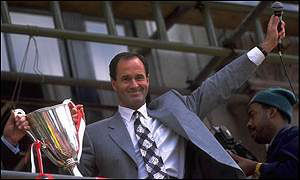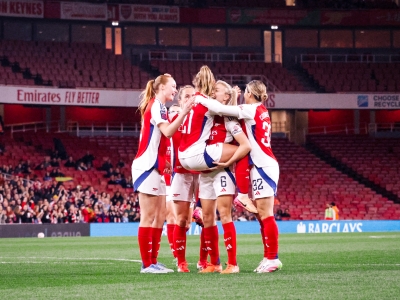What is Arsenal? Long ball or passing to feet? Artists or artisans? Style or substance? Tradition or modernity? English or European? More than a cursory glance and the club reveal contradictions, juxtapositions and dichotomies at every turn. This has been, I would argue, almost entirely due to Arsene Wenger. His tenure has been one of rapid, dizzying change that has transformed this club almost beyond recognition. The result has been a breathless journey that, whilst rooted in the present, has thrown into doubt the very identity of Arsenal, its past and, inevitably, its future.
Little over a decade ago George Graham was lauded as the prototype Arsenal manager. His style mirrored a club ethos that had stretched back over 70 years. Off the pitch Arsenal were the epitome of moneyed style: an élan that extended from the heated changing rooms to the Art Deco stands, that ranged from the ‘Bank of England’ moniker (repeatedly breaking transfer records at a time of national economic crisis) to its famous marble halls. Well before its fiftieth birthday, Arsenal were patrician, old-fashioned and conservative. On the pitch, the grinding, attritional tactics that were developed by Chapman could still be evinced right up to the point that Graham walked (or was thrown) out the door. They were ‘lucky’ because they condensed pressure before breaking away to snatch wins, and ‘boring’ because they won with consistency rather than flair. Lennie Lawrence, the Charlton manager, said in 1987: ‘Once Arsenal go one nil up, you may as well pack your bags and go home.’
That this quote could have applied equally to virtually any Arsenal team from the mid-20’s to the mid-90’s is astonishing. But what is more astonishing is that when this formula stopped working, when the team stopped winning in the fifties, the sixties and the eighties nothing was changed. Instead of being a boring good team, Arsenal were a boring bad team. If the ends justify the means that is one thing, but dourness for its own sake seems slightly, well, masochistic.
And it was masochistic. Nick Hornby’s Fever Pitch would never have been as successful or perceptive had it not been for the peculiarly perverse, fatalistic philosophy that enveloped the club. Thus, when Graham arrived it was on the back of a sequence of events that made the football club resemble some kind of cruel joke: Highbury was half-full, the players didn’t care, the board seemed directionless and the one decent figure in the midst of all this, Don Howe, was undermined and humiliated. Graham brought with him the militaristic zeal required to get a flabby club back into shape. And he was treated as a messiah. Maybe ‘Arsene Knows’ now, but George ‘Knew’ first and it is questionable whether the club would have been able to lure a manager of Wenger’s stature had it not been for the transformation initiated a full ten years before Arsene’s arrival.
And that’s the crux. I believe truly that this is the best football Arsenal have ever played and that, second only to the hegemonic thirties, the most successful period in our history. However, it was a success built on the foundation of Chapman’s, Mee’s and Graham’s philosophies. Wenger inherited a club, he did not invent one. He has won three league titles, but ten preceded those. He undoubtedly improved and elongated the careers of the famous back five (and others) but he did not find them.
Of course, today that is no longer the case: this is unquestionably a Wenger team built on the Wengerian model but it has been accompanied by paranoia amongst the supporters; a terrified unconscious fear that when he leaves the club will ‘revert’ back to its prosaic past. Worse, it seems that to even question aspects of Wenger’s tactics amount somehow to a rejection of his entire opus and a yearning for the ‘bad’ old days of ‘1-0 to the Arsenal’. This schizophrenic approach - denying everything pre-Wenger as somehow regressive and soiled whilst lauding everything since as football nirvana - is, to my eyes at least, entirely wrong. In the same way that the club would have survived Henry’s departure it will also survive Wenger’s. I say a little prayer each day for Arsene and what he has brought to this club, but I also remember that it is the club and not the man I support.
A year ago I suggested (sacrilege, I know) that Wenger might be running out of ideas and that, as a result, perhaps it was time to begin thinking of a replacement: Wenger would move upstairs to the position on the board long promised by David Dein and a new manager would be entrusted with continuing his work in the same way that, for example, Paisley continued Shankley’s. I didn’t suggest a replacement because that was not the point. The point was merely: this will happen, and we should prepare for when it eventually does.
Wenger has, in the relatively short period of a single decade, given this club an alternate template to rival the style, ethos and philosophy that dominated it for the bulk of the last century. However, as with ‘New Labour’ and Tony Blair, it will only be by his successor that the true longevity of ‘Wengerball’ will be judged. Until then, we won’t know if his period marked the inception of a permanent revolution or was simply the anomaly that punctuated a return to type.







